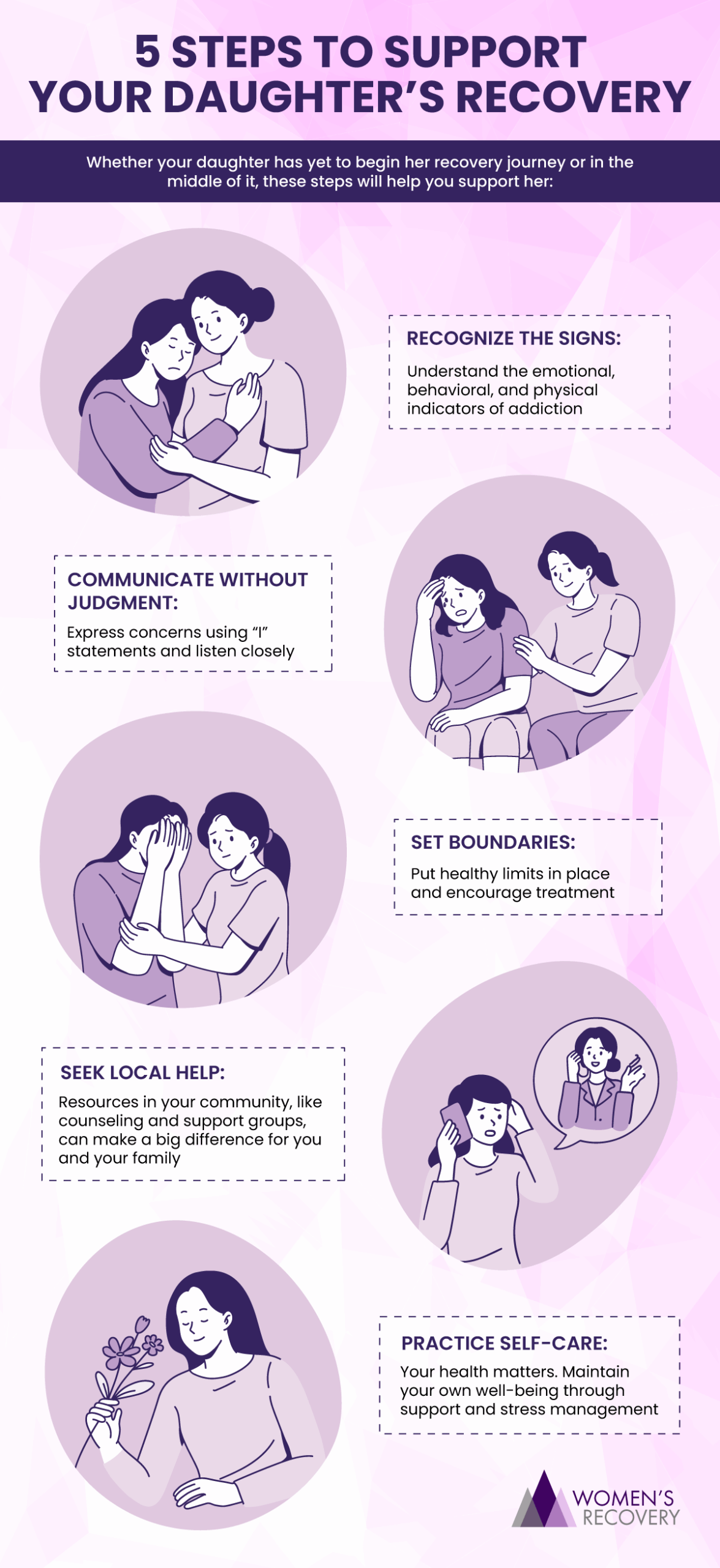Alcohol addiction is a challenging and deeply personal experience—not just for the individual struggling, but for their loved ones. When the person battling substance use is your daughter, it’s even more heartbreaking to watch. Whether your daughter has recently entered recovery or you suspect she may need professional support, understanding how to be there for her along the journey to recovery can be challenging.
At Women’s Recovery, we offer trauma-informed outpatient programs specifically designed for women navigating substance use and mental health challenges. If your family is seeking compassionate and effective care, our women’s alcohol rehab in Denver provides the tools and resources needed to promote sustainable healing. You can also find support through local Al-Anon meetings in Colorado.
Recognizing the Signs of Alcohol Addiction in Your Daughter
It’s impossible to offer the right kind of support when you aren’t sure what’s going on. That’s why it’s essential to be able to recognize when your daughter is struggling with alcohol use disorder (AUD). The signs don’t always look the same from one person to another, but some commonalities may include:
- Behavioral shifts: Mood swings, increased secrecy, isolation, or defensiveness
- Physical symptoms: Bloodshot eyes, frequent hangovers, changes in sleep or appetite
- Declining performance: Struggles in school, work, or personal responsibilities
- Mental health concerns: Anxiety, depression, or past trauma often co-occur with alcohol use
In 2022, the United Health Foundation reported that 24.2% of adult women engaged in binge drinking or heavy drinking during a 30-day period. While the popularity and acceptance of social drinking may make these sorts of stats sound like no big deal, the truth is that drinking excessively can have major health consequences. However, communicating the gravity of your concern for your daughter, without causing her to become defensive, can be difficult.
Effective communication strategies
Talking to your daughter about her alcohol use is one of the most delicate, yet important steps you can take in offering support. Setting the tone from the beginning is vital.
Tips for a constructive conversation:
- Use “I” statements: For example, say “I’m worried about you” instead of “You’re ruining your life.” Using these types of statements helps people feel supported and not judged.
- Pick the right moment: Choose a calm, private setting where you can speak without distractions or heightened emotions.
- Listen without interrupting: Practice active listening to show empathy and reduce defensiveness. Don’t make assumptions. Approach your daughter with curiosity.
- Be prepared for resistance: Chances are, the first conversation will not lead to immediate change. Stay consistent and kind, and be ready to broach the topic again at another time.
An example of how you might choose to begin a conversation like this is, “I’ve noticed you seem overwhelmed lately, and I’m concerned about how often you’ve been drinking. I want to understand and support you.”
Remember, this is a dialogue, not a lecture. Opening the door for increased communication will help your daughter feel like she can come to you with difficult topics like these.
Setting Boundaries and Encouraging Treatment
When a loved one struggles with substance use of any kind, it can create significant conflict within families. As a parent, you may feel pulled toward paying unpaid bills or getting them out of substance-related trouble. But being loving doesn’t mean enabling irresponsible behavior or sacrificing your own well-being. Developing firm yet compassionate boundaries is an essential and often overlooked part of the recovery journey.
What Are Healthy Boundaries when Your Daughter Is Struggling with Alcohol?
It’s important to understand that you’re not being cruel. Setting limits is a way to show you care about your daughter’s health and future. Here are just a few ways to set healthy boundaries:
- Don’t cover for her responsibilities (e.g., calling in sick for her at work)
- If your daughter lives with you, say no to alcohol in your home
- Refuse to provide money that is likely supporting an alcohol habit
It’s also essential to reframe the idea of treatment if your daughter sees it as punishment. Help her to see that treatment is a path to healing, not a negative consequence. You can also emphasize that getting help is a sign of strength, not weakness.
At Women’s Recovery, our outpatient and partial hospitalization programs (PHP) empower women by offering them:
- Trauma-informed care tailored for those with histories of domestic violence or abuse
- Dual diagnosis treatment for co-occurring mental health issues
- Flexible scheduling that supports clients with work, school, or parenting obligations
Through consistent, loving encouragement, your daughter could get the treatment she needs to flourish and shine.
Utilizing Local Support Resources in Denver and Dillon
Finding the right support network is often a game-changer, not just for a daughter with AUD, but for your entire family. Colorado offers a wealth of resources to guide families through this process.
Women’s Recovery programs are offered at our Denver and Dillon locations:
- Outpatient alcohol rehab with trauma-informed and gender-specific care
- Mental health and addiction services, including anxiety, PTSD, and depression treatment
- Additional therapies like neurofeedback and nutrient therapy
Additional Local Support Options
Remember that you and your family need care too. A few additional sources of support can be found locally in the form of:
- Al-Anon and Alateen family groups
- Colorado Crisis Services: 24/7 helpline (1-844-493-TALK) or text TALK to 38255
- Private and group therapy services throughout Denver and Dillon
Support isn’t a solo mission. Connecting with others who understand your journey can provide perspective and hope.
Self-Care for Parents and Guardians
Supporting a daughter through recovery can be emotionally exhausting. It’s easy to fall into a pattern of giving everything to her healing, while neglecting your own needs. Burnout is real, and it’s important to guard against it so that you can be there for your family in all the ways you want to be.
Signs of burnout include:
- Chronic stress or fatigue
- Sleep disturbances
- Loss of interest in hobbies or social activities
- Resentment or guilt
Ways to heal from burnout:
- Attend a support group or seek therapy for your own mental health
- Carve out time for activities that foster healing: reading, walking, journaling, or meditation
- Set emotional boundaries and know that you are not responsible for your daughter’s choices
Your well-being matters. When you care for yourself, you model resilience and show your daughter that healing is a family value.
Women’s Recovery Can Help—Call Today
Women face unique challenges in recovery, and our treatment programs are designed specifically for those identifying as women, including trans women. Women’s Recovery values treatment for all who need it, grounded in empathy and empowerment.
With locations in both Denver and Dillon, we provide flexible, comprehensive care that meets clients where they are. Whether your daughter is just beginning to explore treatment or looking for long-term support, we are here to help. Call 833.754.0554 to speak with a member of our team or submit our online contact form.








